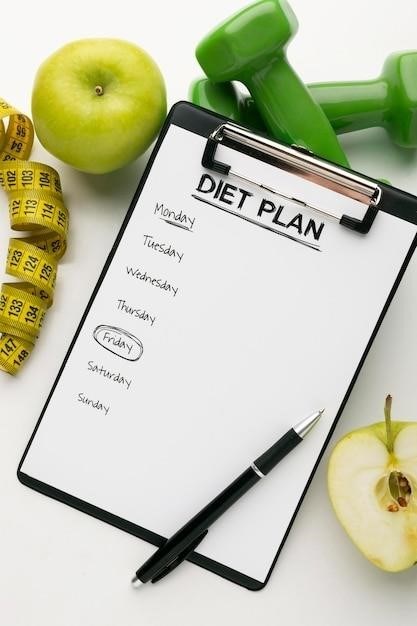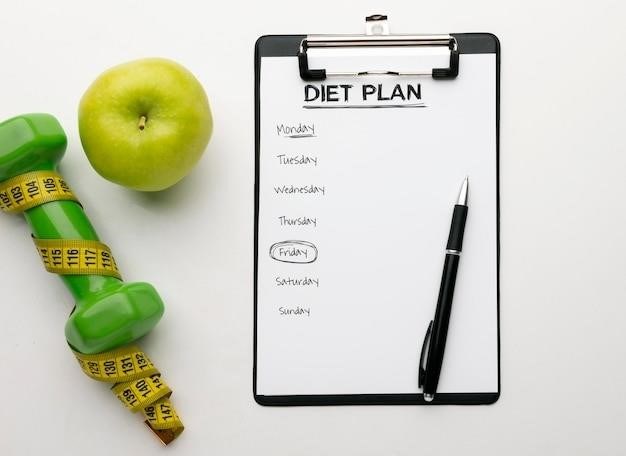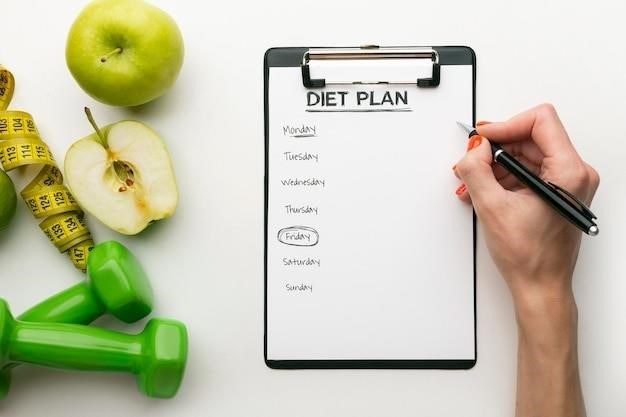Lean Body Diet Plan⁚ A Comprehensive Guide
This guide provides a comprehensive overview of creating a lean body diet plan․ It emphasizes the importance of a balanced diet rich in lean proteins‚ whole grains‚ fruits‚ vegetables‚ and healthy fats‚ while avoiding processed foods and excessive sugars․ A sustainable approach‚ combining proper nutrition with regular exercise‚ is key for long-term success and achieving a healthy‚ lean physique․
Understanding Lean Muscle Mass
Lean muscle mass refers to the muscle tissue in your body that isn’t accompanied by excess fat․ It’s a crucial component of overall health and fitness‚ contributing significantly to your metabolism‚ strength‚ and physical appearance․ Building and maintaining lean muscle mass involves a multifaceted approach encompassing both diet and exercise․ Unlike simply gaining weight‚ the focus is on increasing muscle size and definition while minimizing fat accumulation․ This requires a strategic approach to nutrition‚ prioritizing protein intake to support muscle growth and repair‚ while managing carbohydrate and fat consumption to optimize energy levels and body composition․ Regular strength training is essential to stimulate muscle protein synthesis and promote muscle hypertrophy (growth)․ Understanding the distinction between lean muscle mass and overall body weight is critical for setting realistic goals and tracking progress effectively․ A healthy diet plan for lean muscle growth should be tailored to individual needs and activity levels‚ ensuring adequate nutrient intake to support muscle development and overall well-being․ Remember‚ consistency and patience are key to achieving lasting results․
The Importance of Diet in Building Lean Muscle
Nutrition plays a pivotal role in building lean muscle mass․ It’s not enough to simply lift weights; your body needs the right fuel to support muscle growth and recovery․ A well-structured diet provides the essential building blocks – primarily protein – for muscle protein synthesis․ Protein intake is crucial because it supplies amino acids‚ the components of muscle tissue․ Sufficient carbohydrate intake is also important to provide energy for workouts and to replenish glycogen stores‚ which are essential for muscle function and recovery․ Healthy fats are necessary for hormone production and overall bodily functions․ The appropriate balance of these macronutrients (protein‚ carbohydrates‚ and fats) is crucial for optimal results․ A diet lacking in essential nutrients can hinder muscle growth and recovery‚ leading to plateaus or even muscle loss․ Conversely‚ a well-planned diet fuels muscle growth‚ improves recovery time‚ and helps maintain energy levels throughout the day․ Therefore‚ a tailored diet plan is an indispensable component of any effective lean muscle-building program․ The right diet fuels your workouts‚ supports muscle repair‚ and helps you achieve your fitness goals․ Remember to consult with a nutritionist or registered dietitian to create a personalized plan․
Macronutrient Balance⁚ Protein‚ Carbohydrates‚ and Fats

Achieving a lean physique requires careful consideration of macronutrient balance․ Protein is paramount for muscle growth and repair‚ providing the amino acids necessary for building and maintaining muscle tissue․ Aim for a sufficient daily protein intake‚ adjusting the amount based on your individual needs and activity level․ Carbohydrates serve as the primary energy source for your workouts‚ fueling intense training sessions and ensuring optimal performance․ Choose complex carbohydrates‚ such as whole grains‚ fruits‚ and vegetables‚ over refined sugars for sustained energy release․ Healthy fats are crucial for hormone production‚ nutrient absorption‚ and overall health․ Incorporate sources like avocados‚ nuts‚ seeds‚ and olive oil into your diet for their beneficial effects․ The optimal ratio of these macronutrients will vary depending on your goals‚ activity level‚ and individual metabolism․ Experimentation and tracking may be needed to determine the ideal balance for your body․ Remember that extremely low-fat diets can be detrimental to health and hormonal balance‚ impacting your progress․ A balanced approach‚ with adequate protein for muscle growth‚ sufficient carbohydrates for energy‚ and healthy fats for overall well-being‚ is key to achieving your lean body goals․ Consulting with a registered dietitian can help you determine the right balance for your specific needs․
Sample Meal Plans for Lean Muscle Gain
Sample meal plans are crucial for visualizing a lean muscle-building diet․ These plans aren’t one-size-fits-all; they should be adjusted to individual caloric needs and preferences․ A sample plan might include a breakfast of oatmeal with berries and nuts‚ providing complex carbohydrates and healthy fats for sustained energy․ Lunch could consist of grilled chicken or fish with a large salad‚ offering lean protein and fiber․ Dinner might feature lean ground turkey with brown rice and steamed vegetables‚ continuing the focus on protein and complex carbohydrates․ Snacks should be strategically timed to prevent excessive hunger and support consistent energy levels․ Consider Greek yogurt with fruit‚ a handful of almonds‚ or a protein shake․ Remember to adjust portion sizes based on your individual caloric goals․ These sample plans are meant to be a guide‚ not a strict prescription․ Remember that individual needs and preferences vary greatly‚ and it’s essential to listen to your body’s signals․ Meal timing should also be considered‚ focusing on nutrient intake around workouts to optimize muscle protein synthesis․ The key is consistency and adherence to a balanced diet‚ focusing on whole‚ unprocessed foods․ Experiment with different foods and combinations to find what works best for you․ Consulting a registered dietitian or certified personal trainer can help you create a personalized meal plan tailored to your specific needs and goals․
Vegetarian Lean Body Diet Plan
A vegetarian lean body diet plan requires careful planning to ensure sufficient protein intake without animal products․ Focus on a variety of plant-based protein sources such as lentils‚ beans‚ tofu‚ tempeh‚ quinoa‚ and edamame․ Incorporate a wide range of vegetables for essential vitamins‚ minerals‚ and fiber․ Whole grains like brown rice‚ quinoa‚ and oats provide complex carbohydrates for sustained energy․ Healthy fats are crucial; include sources like avocados‚ nuts‚ seeds‚ and olive oil․ A sample vegetarian meal plan might include a breakfast of Greek yogurt with berries and granola‚ a lunch of a large salad with chickpeas and a whole-wheat pita‚ and a dinner of lentil soup with brown rice․ Snacks could consist of trail mix‚ fruit with nut butter‚ or vegetable sticks with hummus․ Portion control remains essential‚ and calorie intake should be adjusted based on individual activity levels and goals․ Remember that a balanced vegetarian diet requires diligent planning to ensure adequate intake of all necessary nutrients‚ particularly iron‚ calcium‚ and vitamin B12․ Supplementation might be necessary in some cases; consult a healthcare professional or registered dietitian for personalized guidance․ Prioritize whole‚ unprocessed plant-based foods and avoid excessive processed vegetarian substitutes‚ as these often contain added sugars and unhealthy fats․ Hydration is also critical; ensure adequate water intake throughout the day․

Non-Vegetarian Lean Body Diet Plan
A non-vegetarian lean body diet plan offers a wider range of protein sources‚ making it easier to meet daily protein requirements․ Lean meats such as chicken breast‚ turkey‚ fish (salmon‚ tuna‚ cod)‚ and lean cuts of beef are excellent choices․ Prioritize grilling‚ baking‚ or poaching over frying to minimize added fats․ Incorporate eggs for a readily available protein source‚ and consider including Greek yogurt for protein and calcium․ Don’t neglect healthy fats from sources like avocados‚ nuts‚ and olive oil․ A sample non-vegetarian meal plan might include a breakfast of scrambled eggs with spinach and whole-wheat toast‚ a lunch of grilled chicken salad with mixed greens and a light vinaigrette‚ and a dinner of baked salmon with roasted vegetables․ Snacks could be hard-boiled eggs‚ a small portion of mixed nuts‚ or a protein shake․ Portion control remains crucial‚ adjusting calorie intake to match individual needs and goals․ Ensure a balance of macronutrients—protein‚ carbohydrates‚ and fats—to support muscle growth and fat loss; Limit processed meats‚ red meat‚ and high-fat dairy products․ Hydration remains paramount; drink plenty of water throughout the day․ Consulting a registered dietitian or nutritionist can provide personalized guidance for creating a non-vegetarian diet plan tailored to specific needs and preferences․ Pay attention to cooking methods and strive for a balance of lean protein‚ complex carbohydrates‚ and healthy fats․ Regular exercise complements a healthy diet for optimal results․
The Role of Exercise in Achieving a Lean Physique
While diet forms the cornerstone of a lean body plan‚ exercise plays a crucial supporting role․ It accelerates fat loss and builds lean muscle mass‚ enhancing the body’s composition․ A well-rounded exercise routine should incorporate both cardiovascular and strength training elements․ Cardiovascular exercise‚ such as running‚ swimming‚ or cycling‚ burns calories and improves cardiovascular health․ Strength training‚ using weights or resistance bands‚ builds and tones muscles‚ increasing metabolism and making it easier to maintain a lean physique․ A balance is key; excessive cardio can lead to muscle loss‚ while neglecting cardio hinders overall fitness․ Aim for at least 150 minutes of moderate-intensity or 75 minutes of vigorous-intensity cardio per week․ Strength training should be incorporated at least two days per week‚ targeting all major muscle groups․ The intensity and duration of workouts should be adjusted based on individual fitness levels and goals․ Listen to your body; rest and recovery are vital to prevent injuries and allow muscles to rebuild․ Consider incorporating activities you enjoy to ensure adherence to the exercise plan․ Consistency is paramount; regular exercise‚ coupled with a healthy diet‚ yields the most effective results in achieving and maintaining a lean physique․ Remember‚ the combination of diet and exercise is essential for optimal results․ Professional guidance from a certified fitness trainer can assist in designing a safe and effective program tailored to individual needs and capabilities․
Hydration and its Importance in a Lean Body Diet
Adequate hydration is often overlooked but is crucial for a successful lean body diet plan․ Water plays a vital role in numerous bodily functions‚ directly impacting weight management and overall health․ It aids in digestion‚ nutrient absorption‚ and the transportation of nutrients throughout the body․ Staying hydrated helps regulate body temperature‚ preventing overheating during exercise․ Furthermore‚ water can help curb appetite‚ reducing unnecessary snacking․ Studies suggest that drinking water before meals can increase feelings of fullness‚ leading to lower calorie consumption․ Dehydration‚ conversely‚ can lead to fatigue‚ muscle cramps‚ and decreased metabolic rate‚ hindering weight-loss efforts․ The recommended daily water intake varies depending on factors like activity level‚ climate‚ and individual body composition; however‚ aiming for at least eight glasses is a good starting point․ Listen to your body’s signals; thirst is a clear indication of dehydration․ Carry a reusable water bottle and sip throughout the day․ Incorporate water-rich fruits and vegetables into your diet to boost fluid intake․ While other beverages may contribute to hydration‚ water remains the optimal choice due to its lack of calories and added sugars․ Prioritizing hydration alongside a balanced diet and regular exercise will significantly enhance your progress towards a lean physique․ Remember‚ maintaining proper hydration is not merely about drinking enough water; it is about understanding the critical role it plays in overall health and well-being․
Avoiding Common Diet Mistakes
Many individuals embarking on a lean body diet plan fall prey to common pitfalls that hinder progress․ One frequent mistake is overly restrictive dieting‚ leading to nutrient deficiencies and unsustainable habits․ Crash diets‚ characterized by severely limited calorie intake‚ often result in muscle loss and metabolic slowdown․ Another prevalent error is neglecting the importance of regular meals․ Skipping meals can lead to increased hunger and overeating later in the day․ Failing to prioritize adequate protein intake is another critical mistake․ Protein is essential for muscle growth and repair‚ vital for maintaining lean body mass during weight loss․ Neglecting sufficient sleep also impacts results․ Sleep deprivation disrupts hormonal balance‚ potentially increasing appetite and hindering fat loss․ Overemphasizing cardio while neglecting strength training is also counterproductive․ Strength training helps build and preserve muscle‚ boosting metabolism and facilitating fat burning․ Ignoring the role of stress management is another common misstep․ Chronic stress raises cortisol levels‚ potentially promoting fat storage․ Finally‚ failing to track progress and make adjustments along the way is detrimental․ Regularly monitoring food intake‚ exercise‚ and body measurements helps identify areas for improvement and ensures the plan remains effective and sustainable․ Avoiding these common mistakes will significantly improve your chances of achieving your lean body goals․
Creating a Sustainable Long-Term Plan
The key to lasting success with a lean body diet plan lies in creating a sustainable‚ long-term approach rather than a short-term fix․ Instead of drastic changes‚ focus on gradual‚ incremental adjustments to your diet and lifestyle․ This approach is more likely to lead to lasting habit changes and prevents the yo-yo effect of extreme dieting․ Incorporate a variety of nutrient-dense foods you enjoy to prevent boredom and maintain adherence; A balanced diet including lean proteins‚ complex carbohydrates‚ healthy fats‚ fruits‚ and vegetables will provide the necessary nutrients for energy and overall well-being․ Remember that flexibility is crucial; allow for occasional treats without derailing your progress; A rigid‚ overly strict plan can lead to feelings of deprivation and increase the likelihood of abandoning the diet altogether․ Prioritize regular physical activity you find enjoyable․ This might include a mix of cardio and strength training‚ but the key is to find activities you look forward to doing‚ ensuring long-term commitment․ Make sure your plan aligns with your individual preferences‚ dietary needs‚ and lifestyle․ Don’t compare yourself to others; focus on making sustainable choices that work for you․ Regularly reassess and adjust your plan as needed․ Your body’s needs may change over time‚ and adjustments may be necessary to maintain effectiveness and prevent plateaus․ Above all‚ celebrate your progress and remember that maintaining a healthy lifestyle is a journey‚ not a race․
Tracking Progress and Making Adjustments
Regularly monitoring your progress is essential for refining your lean body diet plan and ensuring its effectiveness․ This involves more than just stepping on a scale; consider tracking various metrics to gain a comprehensive understanding of your body’s response․ Regularly weigh yourself‚ but remember that weight fluctuations can occur due to factors like hydration levels․ Instead‚ focus on consistent trends over time․ Measure your body composition using tools like calipers or bioelectrical impedance analysis (BIA) to assess changes in lean muscle mass and body fat percentage․ These measurements offer a more nuanced view of your progress compared to weight alone․ Take body measurements at regular intervals‚ focusing on areas like waist circumference‚ hip circumference‚ and arm circumference․ These measurements can help track changes in body shape and size‚ particularly in areas where fat tends to accumulate․ Keep a food journal to document your daily intake‚ ensuring you’re consistently meeting your macronutrient targets and identifying potential areas for improvement․ Pay attention to how you feel․ Are you experiencing increased energy levels? Improved sleep quality? Better mood? These subjective measures can indicate the effectiveness of your diet plan․ Regularly evaluate your progress in relation to your goals․ Are you meeting your targets? If not‚ identify the areas needing adjustments․ This might involve modifying your calorie intake‚ macronutrient ratios‚ or exercise routine․ Remember‚ consistency is key‚ but flexibility is essential․ Don’t be afraid to make adjustments to your plan as needed to ensure its sustainability and effectiveness․ Seek professional advice if needed․ A registered dietitian or certified personal trainer can provide personalized guidance and help you create a plan tailored to your specific needs and goals․
